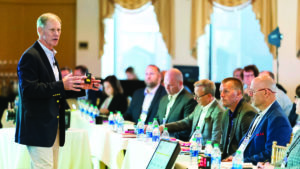
First of a two-part series.
CEOs can count on one thing heading into 2020: There will be no return to business as usual. The unprecedented speed and complexity of change has created a climate in which constant disruption is the new normal. To stave off obsolescence, CEOs need a cadre of gifted leaders in their ranks who are able to see around corners, spot looming threats and identify new opportunities for growth.
Just how to attract, nurture and retain that top talent in a fiercely competitive market was the subject of the 2019 CEO Talent Summit at West Point, where top business and military leaders shared secrets for recruiting and building extraordinary cultures that thrive in change.
That illusive competitive requirement—great culture—was at the heart of the discussion during the two-day conference. “That is the DNA,” said Nigel Travis, chairman of Dunkin’ Brands, where he led as CEO for nine years until 2018. Travis, the author of The Challenge Culture: Why the Most Successful Organizations Run on Pushback, explained that a challenge culture requires constant dissatisfaction with the status quo.

“What exists today is not going to help you in the future—even if you invented it,” said Travis, who was also president and COO of Blockbuster until 2004. He explained that the video rental giant ultimately went bankrupt because it failed to identify the threat from a single scrappy startup. “We studied Netflix passively. We sat there and watched it—you can’t do that,” said Travis. “You have to constantly anticipate your potential demise.”
To do that successfully, you need a culture that welcomes dissent and inspires spirited questioning and effective listening. “Do you, as CEOs, provide your people the opportunity to question the status quo?” he asked attendees. “Because that’s what helps you anticipate the future. Think of vigorous discourse as a way of life.”
At Dunkin’ Brands, Travis instituted weekly “coffee chats” with junior employees so they would have a safe space for honest and transparent communication. CEOs must be authentic leaders, he added, noting that the tone should indeed be set by the CEO, “but you can only do that with your actions—with what you do every single day.”

Most companies would kill for the retention stats of the U.S. military’s Special Operations Forces. Through a grueling 19-year war in Iraq, under treacherous conditions, highly skilled men and women keep on coming back to serve. “And they love what they do,” said retired Lieutenant General Frank Kearney, former deputy director for strategic operational planning at the National Counter-Terrorism Center and now a faculty member at Thayer Leader Development Group. “Why do they do that? Why do they continue to sign up to work in oppressive heat, extreme cold, under fire?”
Perhaps more importantly, how can CEOs inspire the same commitment, enthusiasm, drive and loyalty? Kearney suggested borrowing a page from the military playbook by following these steps:
1. Hire right. Special Ops puts applicants through a battery of tests—physical, intellectual, psychological, medical, stress-testing—to ensure they’re getting people with the competency and skills to engender trust on the part of their fellow soldiers. While Kearney acknowledged most companies can’t apply such rigorous testing, they still need to do more upfront screening. “If you are using the interview as your primary source to recruit, identify and hire people, you are not doing enough to make sure you’re getting the right talent that will stay in your organization.”
2. Train well. In the military, soldiers are constantly trained for the next level up, and they know what they’re being trained for, which improves learning. Kearney cautioned CEOs not to let training go to waste by failing to create opportunities for those new skills. Investing in talent is another way to tell valued employees you care about them. “You can’t guarantee them a job, so how do you make them feel secure? Send them to training. Give them challenges. Give them counseling, coaching, feedback. Make that a priority.”
3. Create ambassadors. Only 10 percent of those who enter the special mission unit training actually make it through to Delta Force, said Kearney, “but 100 percent say, ‘This is the best training experience I’ve had in my entire career.’” Companies need to make sure all employees—even those who ultimately are not a good fit—have a positive experience and feel cared for. “Your organization’s reputation is the No. 1 weapon you have to recruit talent,” said Kearney. “If everybody buys into that, that reputation will precede you.”

Chief Executive Group exists to improve the performance of U.S. CEOs, senior executives and public-company directors, helping you grow your companies, build your communities and strengthen society. Learn more at chiefexecutivegroup.com.
0

1:00 - 5:00 pm
Over 70% of Executives Surveyed Agree: Many Strategic Planning Efforts Lack Systematic Approach Tips for Enhancing Your Strategic Planning Process
Executives expressed frustration with their current strategic planning process. Issues include:
Steve Rutan and Denise Harrison have put together an afternoon workshop that will provide the tools you need to address these concerns. They have worked with hundreds of executives to develop a systematic approach that will enable your team to make better decisions during strategic planning. Steve and Denise will walk you through exercises for prioritizing your lists and steps that will reset and reinvigorate your process. This will be a hands-on workshop that will enable you to think about your business as you use the tools that are being presented. If you are ready for a Strategic Planning tune-up, select this workshop in your registration form. The additional fee of $695 will be added to your total.

2:00 - 5:00 pm
Female leaders face the same issues all leaders do, but they often face additional challenges too. In this peer session, we will facilitate a discussion of best practices and how to overcome common barriers to help women leaders be more effective within and outside their organizations.
Limited space available.

10:30 - 5:00 pm
General’s Retreat at Hermitage Golf Course
Sponsored by UBS
General’s Retreat, built in 1986 with architect Gary Roger Baird, has been voted the “Best Golf Course in Nashville” and is a “must play” when visiting the Nashville, Tennessee area. With the beautiful setting along the Cumberland River, golfers of all capabilities will thoroughly enjoy the golf, scenery and hospitality.
The golf outing fee includes transportation to and from the hotel, greens/cart fees, use of practice facilities, and boxed lunch. The bus will leave the hotel at 10:30 am for a noon shotgun start and return to the hotel after the cocktail reception following the completion of the round.